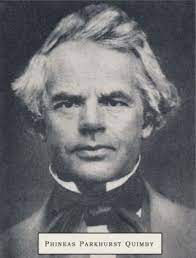Dangerous Teachings In Church
17th to 20th Century: Rationalism and Modern Ideologies
A group of thinkers in the modern era rejected the ideas of ancient scholastic philosophers and adopted the Mechanical Philosophy, which denied the existence of a personal God. This shift towards rationalism paved the way for the development of humanism and various belief systems, including moral relativism, subjectivism, Nihilism, Übermensch, and Null-A. The influence of these thinkers, including Francis Bacon, Rene Descartes, John Locke, Voltaire, Immanuel Kant, Friedrich Nietzsche, and others, has shaped the world we live in today. Their rationalism led to the rise of movements like Empiricism, Existentialism, and Post Modernism. The anti-Aristotelian branch of philosophers in the 1620s contributed greatly to the development of these ideas and belief systems.

Phineas Parkust Quimby (1802-1866)
Founder of New Thought
Known Quotes
“I now stand on the rock of science and prove all things by what I feel and see and not by what others tell me.”
“Disease is the misery of our belief, happiness is the health of our wisdom, so that man’s happiness or misery depends on himself. Now, as our misery comes from our belief, and not from the thing believed, it is necessary to be on the watch, so as not to be deceived by false guides. Sensation contains no intelligence or belief, but is a mere disturbance of the matter, called agitation, which produces mind, and is ready to receive the seed of error. Ever since man was created, there has been an element called error which has been busy inventing answers for every sensation.”
Franz Anton Mesmer (1734-1815) was a German physician who developed the theory of “animal magnetism” and used magnets and hypnosis to treat various illnesses. He is sometimes referred to as the “father of hypnosis.” Both Mesmer and Quimby were influenced by several thinkers and ideas of their time.
“My Theory: The trouble is in the mind, for the body is only the house for the mind to dwell in…If your mind has been deceived by some invisible enemy into a belief, you have put it into the form of a disease, with or without your knowledge. By my theory or truth I come in contact with your enemy and restore you to health and happiness.” – Phineas Quimby
Influenced by
Franz Anton Mesmer ‘Discoverer’ of Animal Magnetism which would later lead his strange practicises to develope hypnotism and occult practices.
His Influence
Marry Baker Eddy (Patient, Student, & Founder of Christian Science)
Julius, Anetta, and Horatio Dresser
Christian Science, Unity Church, Divine Science, Science of Mind, Word of Faith
Created 2015/08/03 | Updated 2023
Church Listing
- What is the church’s statement of faith?
- Which church confession does the church hold to?
- Are the views of the pastor/church complementarian or egalitarian?
- Is the church structure led by one CEO pastor or a plurality of pastors?
- Does the pastor preach topically, expository, or both?
- As a pastor, which Christian authors have had the biggest impact on your life, beliefs, and ministry?